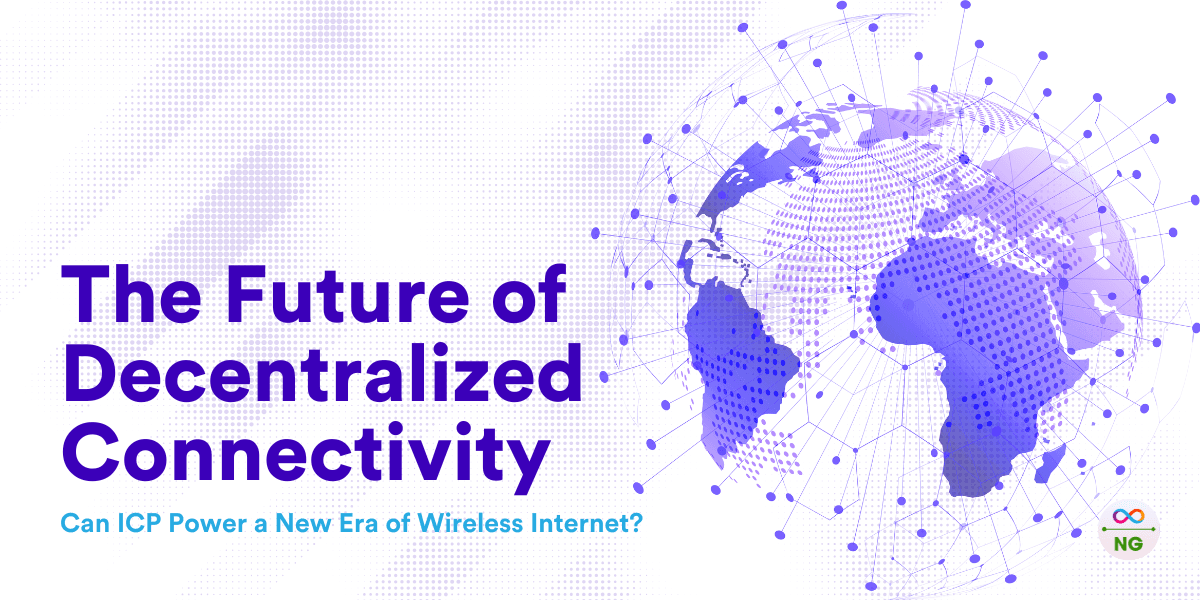The Future of Decentralized Connectivity: Can ICP Power a New Era of Wireless Internet?
February 20, 2025

The Connectivity Problem You Can’t Ignore
How many times have you struggled with poor internet connectivity? If you’re in Africa or other underserved regions, the chances are—far too often. Despite the global push for digital inclusion, only 43% of Africa’s population had internet access as of 2023 (Statista). Compare that to some parts of America, where internet penetration is 90% and above, and the gap becomes painfully clear.
The world is moving toward a digital-first future, where seamless internet access is no longer a luxury but a necessity. Across Africa and other emerging markets, internet adoption is growing rapidly, with millions coming online every year. However, affordability, accessibility, and reliability remain key challenges in many regions.
Traditional internet service providers (ISPs) have long dominated the connectivity space, relying on centralized infrastructure that can be expensive to deploy and maintain. But now, a new wave of innovation is changing the game—one where blockchain and community-driven networks are making decentralized wireless (DeWi) a real alternative.
Helium and Xnet have already shown what’s possible with decentralized networks. Now, Internet Computer Protocol (ICP) could take this concept even further, providing a secure, scalable, and truly decentralized foundation for next-generation wireless connectivity
Why Decentralized Wi-Fi Might Just Be the Future
Decentralized Wi-Fi (DeWi) is a model where individuals and communities own and operate internet access points, rather than relying on traditional telecom companies. This approach:
- Reduces costs by removing centralized middlemen.
- Expands access to underserved areas with community-driven networks.
- Increases privacy and security by decentralizing data control.
- Rewards participants for sharing their connectivity.
Helium and Xnet initially explored CBRS (3.5GHz spectrum) for decentralized wireless networks but later shifted to Wi-Fi-based solutions, recognizing that Wi-Fi is cheaper, easier to deploy, and universally compatible.
But how does ICP fit into this transformation?
How ICP Can Supercharge Decentralized Wi-Fi
Unlike most blockchains, ICP is not just a transaction ledger—it’s a full decentralized cloud, capable of running smart contracts, applications, and AI-driven automation. This makes it an ideal foundation for DeWi networks, enabling:
Decentralized Hosting for Network Services
Most DeWi projects still rely on centralized cloud providers (AWS, Google Cloud) to run their services. ICP eliminates this dependency by providing decentralized smart contracts (canisters) that can:
✅ Host authentication services
✅ Manage user connections securely
✅ Store network and user data without third-party control
Imagine a decentralized Wi-Fi system where users authenticate seamlessly via ICP’s Internet Identity, without needing traditional sign-ups.
Tokenized Incentives & Smart Contracts
One of the biggest hurdles in DeWi adoption is creating sustainable economic models that incentivize participation. ICP’s blockchain-based architecture can power:
- Micropayments for Wi-Fi usage, enabling pay-per-use models without centralized ISPs.
- Smart contracts for automated billing based on bandwidth usage.
- Low-fee transactions, thanks to ICP’s efficient architecture.
This means anyone can launch a decentralized ISP, charging fair prices and avoiding high infrastructure costs.
AI-Driven, Self-Writing Network Management
ICP’s self-writing AI could revolutionize DeWi infrastructure by enabling:
- AI-optimized Wi-Fi mesh networks that adapt to user demand.
- Automated maintenance for hotspot operators.
- Smart pricing adjustments based on network traffic.
With ICP-powered AI, decentralized wireless networks could self-manage and scale effortlessly.
DeWi in Africa: Challenges and Opportunities
Africa has one of the fastest-growing internet user bases in the world, making it a prime region for decentralized wireless innovation. While progress is being made, several challenges need to be addressed:
Barriers to Adoption
- Hardware Costs – Initial setup for hotspots still requires investment.
- Awareness & Education – Many potential participants aren’t yet familiar with DeWi.
- Scalability Issues – Current DeWi networks need improved models to expand effectively.
- Infrastructure Limitations – Some areas lack stable electricity or fiber backbone for efficient deployment.
Opportunities for Developers & Innovators
For developers, DeWi represents a massive untapped market. Key areas to explore include:
- Building DeWi applications on ICP for seamless authentication and payments.
- Creating AI-driven network management tools to optimize Wi-Fi performance.
- Launching DeWi initiatives in growing digital hubs to provide more affordable internet access.
- Using DAOs for decentralized governance, allows communities to co-manage their networks.
With the right innovations, decentralized Wi-Fi can become a scalable, accessible, and user-owned internet model.
Conclusion
The centralized ISP model is no longer the only way forward. With DeWi, powered by ICP, Helium, and Xnet, a more open, affordable, and community-driven internet is within reach.
Now, the question is: Are you ready to be part of this transformation?
If you’re a developer, entrepreneur, or blockchain enthusiast, now is the time to explore DeWi solutions—because the future of internet connectivity isn’t owned by corporations. It’s built by people like you.